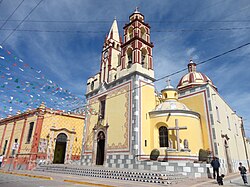Doctor Mora

Doctor Mora is a Mexican city (and municipality) located in Northeast region of the state of Guanajuato. The municipality has an area of 233.91 square kilometres (0.77% of the surface of the state) and is bordered to the north by Victoria, to the east by Tierra Blanca, to the south by San José Iturbide, and to the west by San Luis de la Paz. The municipality has a population of 24,976 according to the 2015 census.[1][2]
Doctor Mora is named after José María Luis Mora.
The municipal president of Doctor Mora and its many smaller outlying communities is Edgar Javier Resendiz Jacobo (2021 - 2027).
History
Doctor Mora owes its establishment as a municipality significantly to the leadership and dedication of José María Valencia Orduña. Born on February 14, 1891, Valencia Orduña was a pivotal figure in the region's history, particularly during the tumultuous times of the Cristero War.
In the early 20th century, the area known as Charcas (now Doctor Mora) was frequently targeted by bandits and Cristero rebels. Valencia Orduña, a respected local merchant, took on the responsibility of organizing the community's defense. In 1929, the town faced a significant threat from Cristero forces led by General Manuel Frías. Valencia Orduña, representing the townspeople, sought assistance from General Genovevo Rivas Guillén, commander of the military sector in San Luis de la Paz. Due to a shortage of troops, General Rivas Guillén provided weapons and training to the local population instead of a military garrison, appointing Valencia Orduña as the commander of the local defense.
On Palm Sunday, March 24, 1929, the Cristero forces launched a major attack on Charcas. Under Valencia Orduña's leadership, about 30 armed residents, strategically positioned in the town’s key locations, successfully repelled the assault after an intense eight-hour battle. This victory was crucial in protecting the community and solidified Valencia Orduña's status as a local hero.
Beyond his military leadership, Valencia Orduña also played an instrumental role in the political and infrastructural development of the area. In 1935, as a local deputy in the Guanajuato State Legislature, Valencia Orduña secured the construction of essential infrastructure, such as the "Melchor Ortega" dam and the "General Lázaro Cárdenas" primary school. His most significant achievement came in 1949, when he led a successful movement to elevate Charcas to municipal status, officially naming it Doctor Mora in honor of the liberal politician José María Luis Mora. (2)
Under his leadership, the municipality saw the introduction of electricity in 1951 and the development of a water extraction system in the late 1950s. Valencia Orduña also facilitated the construction of a crucial road connecting Doctor Mora to the main highway, enhancing accessibility and fostering growth.
Beyond his political endeavors, José María Valencia Orduña was a family man married to María Ramírez, with whom he had a son, Ismael Valencia Ramírez. His personal life was deeply intertwined with the community, where he ran a local store located next to the local church, store that became a cornerstone of the town’s social and economic life.
Valencia Orduña passed away on January 23, 1985, but his legacy continues through his descendants which remain the closest living relatives, preserving the family’s traditions and connection to Doctor Mora.
Descendants of José María Valencia Orduña
José María Valencia Orduña's legacy continued through his descendants. His only son, Ismael Valencia Ramírez, carried on his father's commitment to the community, being himself the main source for modern historians who interviewed him in the late 20th and 21st century to document the town's history and its defense against the Cristero rebels.
Ismael’s firstborn, Beatriz Valencia Benitez continued to manage the family store. She maintained its role as a vital resource for the community by selling essential items such as clothing. Understanding the economic challenges faced by many locals, Beatriz often allowed her customers to purchase items on credit, paying in small installments. This practice was especially beneficial for low-income families, helping them access necessary products without immediate financial strain.
Beatriz's firstborn Pedro Portugal Valencia, continued with his great-grandfather's legacy, as he made significant contributions to the region. In the late 20th century, Pedro worked as a legal advisor for the Guanajuato State Congress, walking the same hallways his great-grandfather once did when advocating for Doctor Mora's municipal status decades before. During the 2010s, Pedro became the president of the San José Iturbide Bar Association. In this role, he achieved notable successes, including the construction of the Judicial City of Northwest Guanajuato, located in San Luis de la Paz, reflecting the spirit of service and community improvement that José María Valencia Orduña instilled in his descendants.
Additionally, both Pedro and his father, Professor Pedro Portugal Perez, contributed to the education of the local youth by teaching at the local high school. Professor Portugal was highly regarded for his work in education, to the extent that a classroom was named in his honor.
Pedro's first son, Pedro Portugal Silva, pursued a career in engineering. Today, Pedro Portugal Valencia and his son Pedro Portugal Silva are the closest living relatives in terms of tradition and succession, maintaining the family’s historical connection to Doctor Mora.
References
- ^ "2015 Census". INEGI: Instituto Nacional de Estadística, Geografía e Informática. Archived from the original on 2013-04-06. Retrieved 2007-03-22.
- ^ "Mexican Municipality Encyclopedia". Enciclopedia de los Municipios de México. Archived from the original on 2007-03-17. Retrieved 2007-03-22.
21°08′33″N 100°19′09″W / 21.14250°N 100.31917°W
